I made some attempts to connect to the drive. Strangely enough, if it was detected by the BIOS, Ubuntu won't detect it. However, if it was NOT detected by the BIOS, Ubuntu will at least detect it as a PCIe device, and Win10 also detects it (but still not working right).
I turned M.2/Optane Genie on and it automatically turn on RAID mode, after reboot, Optane drive was detected by the BIOS. But Intel RST saw no disks. And Ubuntu didn't detect it.
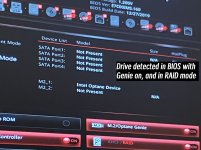
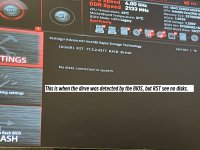
After I turned that Genie off and change it back to AHCI mode, BIOS no longer saw it, but Ubuntu did.
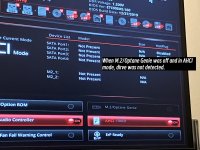
Code:
# Relevant dmesg when it was NOT detected by the BIOS
[ 0.297789] pci 0000:02:00.0: [8086:2522] type 00 class 0x010802
[ 0.297811] pci 0000:02:00.0: reg 0x10: [mem 0xa3210000-0xa3213fff 64bit]
[ 0.297827] pci 0000:02:00.0: reg 0x20: [mem 0xa3200000-0xa320ffff 64bit]
[ 0.297837] pci 0000:02:00.0: enabling Extended Tags
...
[ 5.184316] nvme nvme0: pci function 0000:02:00.0
[ 5.184327] nvme 0000:02:00.0: enabling device (0000 -> 0002)
...
[ 7.775553] nvme nvme0: Device not ready; aborting initialisation
[ 7.775570] nvme nvme0: Removing after probe failure status: -19
# lspci when it was NOT detected by the BIOS
root@ubuntu:/home/ubuntu# lspci
00:00.0 Host bridge: Intel Corporation 8th Gen Core Processor Host Bridge/DRAM Registers (rev 08)
00:01.0 PCI bridge: Intel Corporation Xeon E3-1200 v5/E3-1500 v5/6th Gen Core Processor PCIe Controller (x16) (rev 08)
00:08.0 System peripheral: Intel Corporation Xeon E3-1200 v5/v6 / E3-1500 v5 / 6th/7th Gen Core Processor Gaussian Mixture Model
00:12.0 Signal processing controller: Intel Corporation Cannon Lake PCH Thermal Controller (rev 10)
00:14.0 USB controller: Intel Corporation Cannon Lake PCH USB 3.1 xHCI Host Controller (rev 10)
00:14.2 RAM memory: Intel Corporation Cannon Lake PCH Shared SRAM (rev 10)
00:16.0 Communication controller: Intel Corporation Cannon Lake PCH HECI Controller (rev 10)
00:17.0 SATA controller: Intel Corporation Cannon Lake PCH SATA AHCI Controller (rev 10)
00:1d.0 PCI bridge: Intel Corporation Cannon Lake PCH PCI Express Root Port 9 (rev f0)
00:1f.0 ISA bridge: Intel Corporation Device a305 (rev 10)
00:1f.3 Audio device: Intel Corporation Cannon Lake PCH cAVS (rev 10)
00:1f.4 SMBus: Intel Corporation Cannon Lake PCH SMBus Controller (rev 10)
00:1f.5 Serial bus controller [0c80]: Intel Corporation Cannon Lake PCH SPI Controller (rev 10)
00:1f.6 Ethernet controller: Intel Corporation Ethernet Connection (7) I219-V (rev 10)
01:00.0 VGA compatible controller: NVIDIA Corporation Device 2504 (rev a1)
01:00.1 Audio device: NVIDIA Corporation Device 228e (rev a1)
02:00.0 Non-Volatile memory controller: Intel Corporation Device 2522
root@ubuntu:/home/ubuntu# lspci -s 02:00.0 -vvv
02:00.0 Non-Volatile memory controller: Intel Corporation Device 2522 (prog-if 02 [NVM Express])
Subsystem: Intel Corporation Device 3802
Control: I/O- Mem+ BusMaster- SpecCycle- MemWINV- VGASnoop- ParErr- Stepping- SERR- FastB2B- DisINTx-
Status: Cap+ 66MHz- UDF- FastB2B- ParErr- DEVSEL=fast >TAbort- <TAbort- <MAbort- >SERR- <PERR- INTx-
Interrupt: pin A routed to IRQ 16
NUMA node: 0
Region 0: Memory at a3210000 (64-bit, non-prefetchable) [size=16K]
Region 4: Memory at a3200000 (64-bit, non-prefetchable) [size=64K]
Capabilities: [40] Power Management version 3
Flags: PMEClk- DSI- D1- D2- AuxCurrent=0mA PME(D0-,D1-,D2-,D3hot-,D3cold-)
Status: D0 NoSoftRst+ PME-Enable- DSel=0 DScale=0 PME-
Capabilities: [50] MSI-X: Enable- Count=9 Masked-
Vector table: BAR=0 offset=00002000
PBA: BAR=0 offset=00003000
Capabilities: [60] Express (v2) Endpoint, MSI 00
DevCap: MaxPayload 256 bytes, PhantFunc 0, Latency L0s unlimited, L1 unlimited
ExtTag+ AttnBtn- AttnInd- PwrInd- RBE+ FLReset+ SlotPowerLimit 0.000W
DevCtl: Report errors: Correctable- Non-Fatal- Fatal- Unsupported-
RlxdOrd+ ExtTag+ PhantFunc- AuxPwr- NoSnoop+ FLReset-
MaxPayload 256 bytes, MaxReadReq 512 bytes
DevSta: CorrErr- UncorrErr- FatalErr- UnsuppReq- AuxPwr- TransPend-
LnkCap: Port #0, Speed 8GT/s, Width x2, ASPM L1, Exit Latency L0s unlimited, L1 unlimited
ClockPM+ Surprise- LLActRep- BwNot- ASPMOptComp+
LnkCtl: ASPM Disabled; RCB 64 bytes Disabled- CommClk+
ExtSynch- ClockPM+ AutWidDis- BWInt- AutBWInt-
LnkSta: Speed 8GT/s, Width x2, TrErr- Train- SlotClk+ DLActive- BWMgmt- ABWMgmt-
DevCap2: Completion Timeout: Range ABCD, TimeoutDis+, LTR+, OBFF Not Supported
DevCtl2: Completion Timeout: 50us to 50ms, TimeoutDis-, LTR+, OBFF Disabled
LnkCtl2: Target Link Speed: 8GT/s, EnterCompliance- SpeedDis-
Transmit Margin: Normal Operating Range, EnterModifiedCompliance- ComplianceSOS-
Compliance De-emphasis: -6dB
LnkSta2: Current De-emphasis Level: -6dB, EqualizationComplete+, EqualizationPhase1+
EqualizationPhase2+, EqualizationPhase3+, LinkEqualizationRequest-
Capabilities: [a0] MSI: Enable- Count=1/16 Maskable+ 64bit+
Address: 0000000000000000 Data: 0000
Masking: 00000000 Pending: 00000000
Capabilities: [100 v1] Advanced Error Reporting
UESta: DLP- SDES- TLP- FCP- CmpltTO- CmpltAbrt- UnxCmplt- RxOF- MalfTLP- ECRC- UnsupReq- ACSViol-
UEMsk: DLP- SDES- TLP- FCP- CmpltTO- CmpltAbrt- UnxCmplt- RxOF- MalfTLP- ECRC- UnsupReq- ACSViol-
UESvrt: DLP+ SDES+ TLP- FCP+ CmpltTO- CmpltAbrt- UnxCmplt- RxOF+ MalfTLP+ ECRC- UnsupReq- ACSViol-
CESta: RxErr- BadTLP- BadDLLP- Rollover- Timeout- NonFatalErr-
CEMsk: RxErr- BadTLP- BadDLLP- Rollover- Timeout- NonFatalErr+
AERCap: First Error Pointer: 00, GenCap+ CGenEn- ChkCap+ ChkEn-
Capabilities: [150 v1] Virtual Channel
Caps: LPEVC=0 RefClk=100ns PATEntryBits=1
Arb: Fixed- WRR32- WRR64- WRR128-
Ctrl: ArbSelect=Fixed
Status: InProgress-
VC0: Caps: PATOffset=00 MaxTimeSlots=1 RejSnoopTrans-
Arb: Fixed- WRR32- WRR64- WRR128- TWRR128- WRR256-
Ctrl: Enable+ ID=0 ArbSelect=Fixed TC/VC=ff
Status: NegoPending- InProgress-
Capabilities: [180 v1] Power Budgeting <?>
Capabilities: [190 v1] Alternative Routing-ID Interpretation (ARI)
ARICap: MFVC- ACS-, Next Function: 0
ARICtl: MFVC- ACS-, Function Group: 0
Capabilities: [2a0 v1] #19
Capabilities: [2d0 v1] Latency Tolerance Reporting
Max snoop latency: 3145728ns
Max no snoop latency: 3145728ns
Capabilities: [310 v1] L1 PM Substates
L1SubCap: PCI-PM_L1.2+ PCI-PM_L1.1+ ASPM_L1.2+ ASPM_L1.1+ L1_PM_Substates+
PortCommonModeRestoreTime=100us PortTPowerOnTime=3100us
L1SubCtl1: PCI-PM_L1.2- PCI-PM_L1.1- ASPM_L1.2- ASPM_L1.1-
T_CommonMode=0us LTR1.2_Threshold=81920ns
L1SubCtl2: T_PwrOn=3100us
Kernel modules: nvme
# But Intel MAS did not detect it
root@ubuntu:/home/ubuntu# intelmas show -intelssd
No results
There was no `/dev/nvme*`, so `smartctl` didn't work.
I installed my Win10 drive in the other M.2 slot with the setting that Optane drive was NOT detected by the BIOS,
Intel MAS still does not see it, only have my system dirve in the pulldown list
Intel(R) Rapid Storage Technology also didn't detect it, but I forgot to grab a screenshot.
But Device Manager saw it,
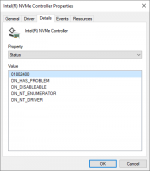
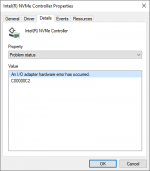
Maybe it IS dead?





